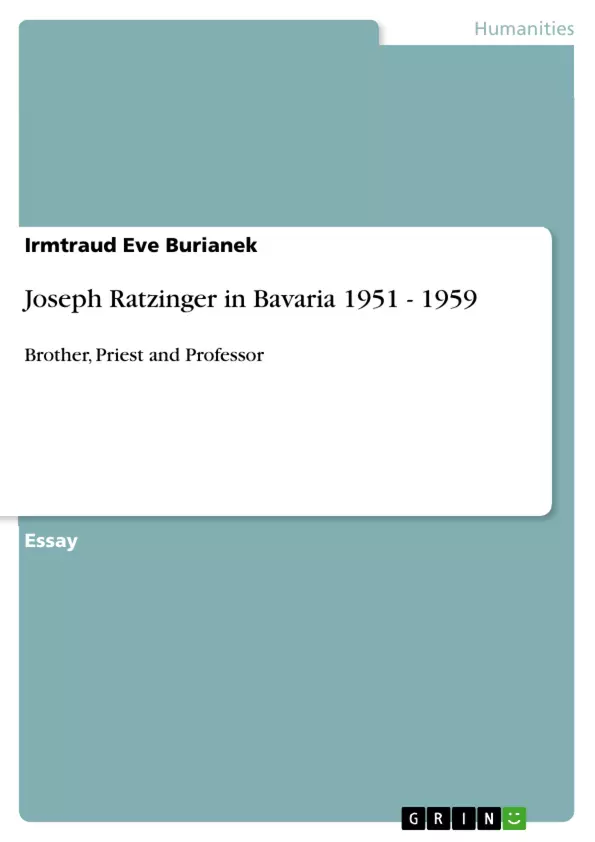“My heart is Bavarian” – these words of Benedict XVI show the present Pope’s deep attachment to his native region. Whoever wants to understand Joseph Ratzinger is well advised to look into his Bavarian upbringing and background. Marktl, Tittmoning, Traunstein, Munich and Regensburg are the stations of his Bavarian upbringing and his early career.
Many stations in the life of the Ratzinger brothers were parallel. They had lived through the dark times of Nazi dictatorship. They were drafted as soldiers at the end of the war and became POWs after the German capitulation. Already in their boyhood, they had decided to become priests. They studied together at the seminary in Freising while also attending philosophy and theology seminars at the war-torn university of Munich. After their ordination, the young priests were assigned to churches in Munich and worked in parishes. However, their outstanding intellectual inclination led them soon back to academic careers and both eventually became professors at the venerable university of of Regensburg.
This article examines the decisive time from 1951 to 1959 of the future pope in his native Bavaria.
Inhaltsverzeichnis (Table of Contents)
- Joseph Ratzinger and his Brother Georg
- Parallel Lives and Shared Aspirations
- Post-War Renewal and Theological Inspiration
- The Influence of Romano Guardini and Hans Urs von Balthasar
- The Influence of St. Augustine
- St. Bonaventure and the Theology of History
- The Early Career of Joseph Ratzinger
Zielsetzung und Themenschwerpunkte (Objectives and Key Themes)
This text delves into the early life and theological formation of Joseph Ratzinger, the future Pope Benedict XVI, focusing on his experiences in Bavaria during the years 1951-1959.
- The shared journey and parallel careers of Joseph and Georg Ratzinger.
- The influence of post-war renewal and the theological inspirations of Romano Guardini and Hans Urs von Balthasar.
- The role of St. Augustine and St. Bonaventure in shaping Ratzinger's theological perspective.
- Ratzinger's early academic career and his rise as a prominent theologian in Germany.
- The Bavarian context and its influence on Ratzinger's development.
Zusammenfassung der Kapitel (Chapter Summaries)
The text begins by introducing the Ratzinger brothers and their shared ordination in 1951. It then highlights the parallel paths they followed in their lives, from their shared experiences during World War II to their decision to become priests and their subsequent careers in academia.
The text then explores the broader context of post-war theological renewal, emphasizing the influence of key figures like Romano Guardini and Hans Urs von Balthasar on Joseph Ratzinger's theological development.
The following chapters delve into the influence of St. Augustine and St. Bonaventure on Ratzinger's theological thought. The text highlights the themes of grace, reason, and the pursuit of truth as crucial elements in Ratzinger's early theological formation.
The final chapter focuses on Ratzinger's early academic career, outlining his journey from doctoral student to university professor in Germany. The text describes his significant intellectual contributions during this period and his growing prominence as a theologian.
Schlüsselwörter (Keywords)
Key concepts and figures explored in this text include Joseph Ratzinger, Georg Ratzinger, Bavarian context, post-war theological renewal, Romano Guardini, Hans Urs von Balthasar, St. Augustine, St. Bonaventure, theology of history, grace, reason, faith, and early academic career.
Frequently Asked Questions
Who was Joseph Ratzinger during 1951-1959?
During this period, the future Pope Benedict XVI was a young priest and rising academic theologian in Bavaria, Germany.
What influence did Romano Guardini have on Ratzinger?
Guardini was a key figure in post-war theological renewal who deeply influenced Ratzinger's intellectual and spiritual formation.
How did St. Augustine shape Ratzinger's theology?
Ratzinger's doctoral work focused on Augustine, adopting his views on the relationship between grace, reason, and the Church.
What was the role of Georg Ratzinger in Joseph's life?
Georg was Joseph's brother; they were ordained together in 1951 and shared parallel lives as priests and academics in Bavaria.
Why is his Bavarian background important for understanding him?
Benedict XVI often stated "My heart is Bavarian," reflecting how the region's culture and traditions formed his identity and papal outlook.
- Citation du texte
- Dr.phil. Irmtraud Eve Burianek (Auteur), 2010, Joseph Ratzinger in Bavaria 1951 - 1959, Munich, GRIN Verlag, https://www.grin.com/document/168589



